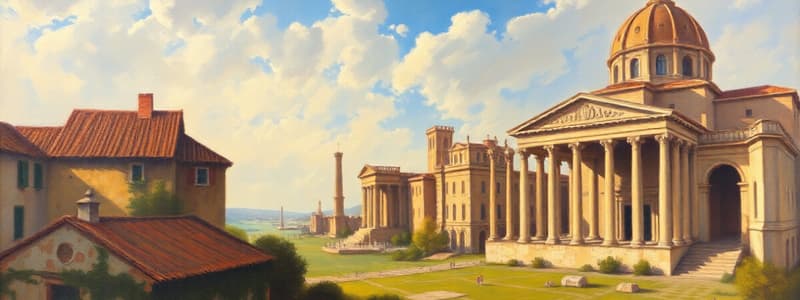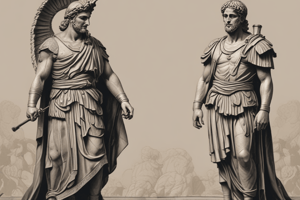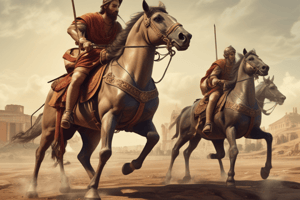Podcast
Questions and Answers
What marked the transition from the Regal period to the Republican period in Rome?
What marked the transition from the Regal period to the Republican period in Rome?
- Introduction of democracy with elected representatives (correct)
- Establishment of the first Roman emperor
- Conquest of the Greek territories
- Construction of the first aqueduct
Which event occurred during the Imperial period of Ancient Rome?
Which event occurred during the Imperial period of Ancient Rome?
- The establishment of the Roman language, Latin
- The assassination of Julius Caesar
- The rise of the first Roman emperor (correct)
- The construction of the road system
How did Rome's military achievements contribute to its success?
How did Rome's military achievements contribute to its success?
- By focusing only on defensive wars within Italy
- Through strategic conquests that expanded its territory (correct)
- By forming alliances with powerful kingdoms
- By relying solely on mercenary forces
Which cultural influence significantly shaped Roman religious practices?
Which cultural influence significantly shaped Roman religious practices?
What was one of the main engineering advancements made by the Romans?
What was one of the main engineering advancements made by the Romans?
Which aspect of culture did Rome adopt from the Greeks?
Which aspect of culture did Rome adopt from the Greeks?
What did Rome's policy of incorporating cultures from conquered lands lead to?
What did Rome's policy of incorporating cultures from conquered lands lead to?
Which structure is an example of Roman architecture heavily influenced by Greek elements?
Which structure is an example of Roman architecture heavily influenced by Greek elements?
Flashcards are hidden until you start studying
Study Notes
Ancient Rome: A Story of Evolution and Domination
- Ancient Rome, a civilization that thrived for over 1,000 years, demonstrated a remarkable ability to adapt and conquer.
- Originating as a small village on the Tiber River in central Italy, it evolved into an empire spanning from the North Atlantic to the Persian Gulf.
- Rome's history is divided into three periods: Regal, Republican, and Imperial.
- The Regal period (753-509 BCE) was ruled by seven kings, with Romulus, considered the legendary founder, establishing Rome in 753 BCE.
- In 509 BCE, the Roman Republic was established, with governance shifting to a system of two annually elected representatives, known as praetors, later called consuls.
- Julius Caesar, a prominent general and dictator, emerged during this period.
- The Imperial period marked the rise of the Roman Empire, with Octavian, the first Roman emperor, ushering in an era of peace.
- Nero, known as one of Rome's most cruel rulers, also emerged during this period.
- Rome’s military prowess played a crucial role in its growth, starting as early as the Regal period when it was just a small village.
- Through gradual conquest and annexation, Rome dominated the Italian peninsula and the Mediterranean Sea, conquering the Greeks, Egyptians, and Carthaginians.
- Its military achievements extended to territories like Britain and Iraq.
- The empire's vast scale and growing population necessitated advancements in Roman engineering, including the construction of aqueducts, which improved public health and water access.
- A 50,000-mile-long road system was built, facilitating movement of people and ideas throughout the empire.
- This increased contact with diverse cultures fostered the evolution of Roman culture.
- Rome's policy of incorporating cultures from conquered lands contributed to its success and longevity.
- Latium influenced the Roman language, Latin, which became the official language of the empire and the ancestor to European Romance languages.
- The Etruscans influenced Rome’s religious practices, alphabet, and the spectacle of gladiatorial combat.
- Ancient Greece profoundly influenced Roman art and architecture, with Roman elites commissioning paintings and sculptures imitating Greek styles.
- Greek architectural elements, such as columns, were incorporated into Roman structures like the Pantheon and Colosseum.
- The rise of Christianity, originating in the Middle East, significantly impacted the empire.
- Constantine I, the first Roman emperor to convert to Christianity, facilitated its spread throughout Europe and transformed Rome into a Christian state.
- After a lifespan of over a millennium, the Roman Empire declined in the 4th century due to factors such as political corruption, economic crises, class conflict, invasions, and military threats.
- Rome's ability to integrate diverse cultures, dominate rivals, and adapt political systems to its people's needs provides valuable lessons for all times.
Ancient Rome
- A civilization that thrived for over 1,000 years, demonstrating a remarkable ability to adapt and conquer.
- Originated as a small village on the Tiber River in central Italy and evolved into an empire spanning from the North Atlantic to the Persian Gulf.
Roman History
- Divided into three periods: Regal, Republican, and Imperial.
- Regal period (753-509 BCE) ruled by seven kings, with Romulus, considered the legendary founder, establishing Rome in 753 BCE.
- Roman Republic was established in 509 BCE, with governance shifting to a system of two annually elected representatives, known as praetors, later called consuls.
- Julius Caesar, a prominent general and dictator, emerged during this period.
- The Imperial period marked the rise of the Roman Empire, with Octavian, the first Roman emperor, ushering in an era of peace.
- Nero, known as one of Rome's most cruel rulers, also emerged during this period.
Roman Military
- Played a crucial role in Rome's growth, starting as early as the Regal period when it was just a small village.
- Through gradual conquest and annexation, Rome dominated the Italian peninsula and the Mediterranean Sea, conquering Greeks, Egyptians, and Carthaginians.
- Its military achievements extended to territories like Britain and Iraq.
Roman Engineering
- The empire's vast scale and growing population necessitated advancements in Roman engineering, including the construction of aqueducts, which improved public health and water access.
- A 50,000-mile-long road system was built, facilitating movement of people and ideas throughout the empire.
Roman Culture
- Increased contact with diverse cultures fostered the evolution of Roman culture.
- Rome’s policy of incorporating cultures from conquered lands contributed to its success and longevity.
- Latium influenced the Roman language, Latin, which became the official language of the empire and the ancestor to European Romance languages.
- The Etruscans influenced Rome’s religious practices, alphabet, and the spectacle of gladiatorial combat.
- Ancient Greece profoundly influenced Roman art and architecture, with Roman elites commissioning paintings and sculptures imitating Greek styles.
- Greek architectural elements, such as columns, were incorporated into Roman structures like the Pantheon and Colosseum.
Rise of Christianity
- The rise of Christianity, originating in the Middle East, significantly impacted the empire.
- Constantine I, the first Roman emperor to convert to Christianity, facilitated its spread throughout Europe and transformed Rome into a Christian state.
Roman Empire Decline
- After a lifespan of over a millennium, the Roman Empire declined in the 4th century due to factors such as political corruption, economic crises, class conflict, invasions, and military threats.
Roman Legacy
- Rome's ability to integrate diverse cultures, dominate rivals, and adapt political systems to its people's needs provides valuable lessons for all times.
Studying That Suits You
Use AI to generate personalized quizzes and flashcards to suit your learning preferences.




